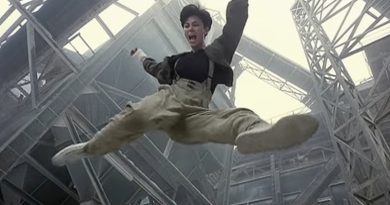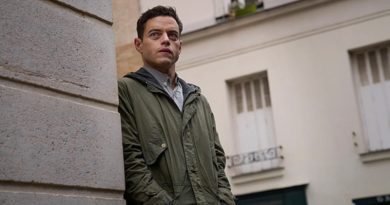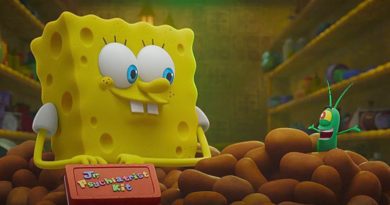Legend of the Condor Heroes: The Gallants 射雕英雄传: 侠之大者 (2025) Review: Tsui Hark’s Middling Return to the Wuxia Genre
Legend of the Condor Heroes: The Gallants marks Tsui Hark’s much-anticipated return to the wuxia genre since Detective Dee: The Four Heavenly Kings seven years ago. The movie was originally screened in China and Hong Kong during the crowded Chinese New Year season before Sony Pictures International Productions acquired the international rights for the theatrical rollouts in selected countries post-festive month in late February. But what should have been a cause for celebration since he adapted Jin Yong’s famous Condor Trilogy novel series, specifically The Legend of the Condor Heroes, surprisingly, is a huge disappointment.
Although Tsui Hark had his fair share of mediocre-to-poor directorial efforts throughout his career, I still find it hard to believe this is the work of a genre veteran who is no stranger to Jin Yong’s work, which can be seen during the early ’90s including Swordsman and Swordsman II adapted from The Smiling, Proud Wanderer.
So, in Legend of the Condor Heroes: The Gallants, Tsui Hark and co-writer Song Xuan choose to cover the later parts of Jin Yong’s novel from Chapters 34 to 40. The movie begins with Guo Jing’s (Xiao Zhan) voiceover narration summarising the Mongols led by Genghis Khan a.k.a. The Great Khan (Bayaertu) unified the tribes to battle against the domineering Jin Dynasty. We learn that Jing grew up in Mongolia and knows how to speak their mother tongue, even though he is a Song people. He has seen many wars throughout his lifetime so far and at the beginning of the movie, his quest revolves around locating a missing girl named Huang Rong (Zhuang Dafei).
The movie then takes us to a lengthy flashback during one stormy night when Jing and Rong witnessed so many deaths scattered on the battlefield. The background details surrounding these two characters are mainly told in brief, verbal expositions like how Jing finds out about where she grows up, eschewing the more effective “show, don’t tell” narrative approach. Rong is also a good cook, especially her signature Peace Blossom Wine Chicken.
It isn’t even the first half of the movie but I already started to feel frustrated over Tsui’s strangely disjointed and fragmented storytelling, complete with his over-reliance on staccato editing to piece everything together. For instance, there’s a scene where the movie shows from Rong’s perspective via a voiceover narration as she has been searching for Jing as well. Upon laying out the exposition regarding the fearsome Venom West a.k.a. Ouyang Feng (Tony Leung Ka-Fai), who’s been longing to get his hands on the all-important martial tome known as The Novem Scripture, the next thing we know is Rong being held captive at his lair.
Such an editing style is nothing new and while it can work well in some movies (Wong Kar-Wai’s Ashes of Time, which was coincidentally inspired by the same Jin Yong’s novel quickly comes to mind), a sprawling story like Jin Yong’s The Legend of the Condor Heroes novel should have been ideally told in a more traditional structure. This is especially true since Tsui wants to encompass multiple storytelling elements within a single movie. Although it does run a significantly longer duration at nearly 2 1/2 hours, the movie still feels like it is scattered all over the place.
Certain scenes are too brief or condensed for their own good like the way Tsui chooses to gloss over Jing’s training with the Northern Beggar a.k.a. Hong Qigong (Hu Jun) as he learns different martial arts techniques such as the Eighteen Dragon Palms and the Dragon Quake, where the latter allows him to strike through objects with a single blow. Or the part where the scene abruptly shows Jing blaming Rong over certain deaths and despising her ever since.
The problem with the love-hate relationship between Jing and Rong is barely justified since the movie doesn’t even bother to develop its characters in the first place. If that’s not enough, the movie continues to emphasise the attempted romance angle with the subsequent introduction of Khan’s daughter, the Mongolian princess Huajun (Zhang Wenxin).
The second half is mostly devoted to the story set in the Mongol base camp and how the varied conflicts begin to take shape. But by then, Tsui had already done enough damage in the messy first half, and the movie spent less time on character development, wasting the dedication that Xiao Zhan, Zhuang Dafei, and newcomer Zhang Wenxin had poured into their respective performances. For instance, Xiao Zhan reportedly learned to speak Mongolian and insisted on using his own voice without relying on the post-production dubbing process. It was an admirable effort and while he does look the part to play a determined young man fighting for his people, it’s a pity his character is sadly underwritten.
In the meantime, Tony Leung Ka-Fai hams it up in his otherwise one-dimensional antagonist role as Ouyang Feng, whose over-the-top theatrics see the screen veteran going against Jing in an action-packed third act. The CG-heavy fight scene may have been plagued by some shoddy effects, but Tsui still has what it takes to stage an elaborate, gravity-defying martial arts moment with the help of dynamic camerawork.
Tsui Hark’s big-screen adaptation is reportedly the first movie in a planned trilogy but assuming the two movies are getting the greenlight, here’s hoping the follow-ups manage to improve considerably over the tepid Legend of the Condor Heroes: The Gallants.





